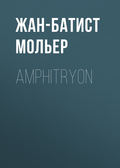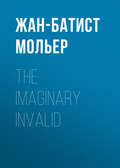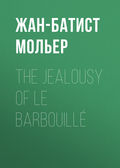
Мольер (Жан-Батист Поклен)
Monsieur De Pourceaugnac
SCENE VI. – ÉRASTE, MR. DE POURCEAUGNAC, SBRIGANI
Era. Ah, who is this? What do I see? What a happy meeting! Mr. de Pourceaugnac! How delighted I am to see you! What! anyone would think that you find it difficult to remember me!
Mr. Pour. Sir, I am your servant.
Era. Is it possible that five or six years can have made you forget me? Do you not remember the best friend of the de Pourceaugnacs?
Mr. Pour. Yes, yes. (Aside to Sbrigani) Deuce take me if I know who he is.
Era. There is not one of the de Pourceaugnacs of Limoges that I do not know, from the greatest to the smallest; I visited only them during my stay there, and I had the honour of seeing you every day.
Mr. Pour. The honour was mine, Sir.
Era. You do not remember my face?
Mr. Pour. Yes, yes. (To Sbrigani) I don't know him a bit.
Era. You do not remember that I had the pleasure of drinking with you I don't know how many times?
Mr. Pour. Excuse me. (To Sbrigani) I don't know anything about it.
Era. What is the name of that pastrycook who cooks such capital dinners?
Mr. Pour. Petit-Jean.
Era. Just so. We used often to go there together to enjoy ourselves. How do you call that place where people go for a walk?
Mr. Pour. The cemetery of the Arènes.
Era. Exactly. It is there I enjoyed so many happy hours of your pleasant talk. Don't you remember it all now?
Mr. Pour. Pardon me; yes, I remember. (To Sbrigani) Deuce take me if I do.
Sbri. (aside to Mr. de Pourceaugnac). There are a hundred things like that which one is apt to forget altogether.
Era. Let us embrace, I pray, and renew our former friendship.
Sbri. (to Mr. de Pourceaugnac). This man seems to have a great affection for you.
Era. Tell me some news of all the family. How is that gentleman your … he who is such an honest man?
Mr. Pour. My brother the sheriff? 7
Era. Yes.
Mr. Pour. He is as well as can be.
Era. I am delighted to hear it. And that good tempered man? You know, your …
Mr. Pour. My cousin, the assessor?
Era. Exactly.
Mr. Pour. Always gay and hearty.
Era. It gives me much pleasure to hear it. And your uncle, the …
Mr. Pour. I have no uncle.
Era. But you had one in those days?
Mr. Pour. No; only an aunt…
Era. Ah! it's what I meant; your aunt; Mrs… How is she?
Mr. Pour. She died six months ago.
Era. Alas! poor woman. She was so good, too!
Mr. Pour. We have also my nephew, the canon, who almost died of the smallpox.
Era. What a pity if it had happened!
Mr. Pour. Do you know him also?
Era. Indeed I do; a tall handsome fellow.
Mr. Pour. Not so very tall.
Era. No; but well-shaped.
Mr. Pour. Yes, yes.
Era. He's your nephew, isn't he?
Mr. Pour. Yes.
Era. Son of your brother or your sister?
Mr. Pour. True.
Era. A canon of the church of… How do you call it?
Mr. Pour. Saint Stephen.
Era. Just so; I don't know any other.
Mr. Pour. (to Sbrigani). He knows all my relations.
Sbri. He knows you better than you think.
Mr. Pour. You must have lived a long time in our town, I see.
Era. Two whole years.
Mr. Pour. You were there, then, when our governor was godfather to my cousin the assessor's child?
Era. To be sure; I was one of the first invited.
Mr. Pour. The thing was well done.
Era. Very.
Mr. Pour. The dinner was well got up.
Era. Yes, indeed.
Mr. Pour. Then you must remember the quarrel I had with that gentleman from Périgord.
Era. Yes.
Mr. Pour. He met with his match, eh?
Era. Ah! ah!
Mr. Pour. He slapped my face; but I paid him back handsomely.
Era. Very handsomely. By the bye, I shall not allow you to go to any other house but mine.
Mr. Pour. I would not…
Era. Nonsense! I will not allow one of my best friends to go anywhere but to my house.
Mr. Pour. It would be disturb…
Era. No; deuce take it all. You shall stay with me.
Sbri. (to Mr. de Pourceaugnac). Since he will have it so, I advise you to accept.
Era. Where is your luggage?
Mr. Pour. With my servant, where we stopped.
Era. Send somebody to fetch it.
Mr. Pour. No. I forbade him to let it go out of his sight, for fear of swindlers.
Sbri. You did quite right.
Mr. Pour. It is good to be cautious in this place.
Era. We always know a man of sense.
Sbri. I will accompany this gentleman, and bring him back where you wish.
Era. Do so. I have a few orders to give; but you only need come to that house yonder.
Sbri. We will come back presently.
Era. (to Mr. de Pourceaugnac). I shall expect you with great impatience.
Mr. Pour. (to Sbrigani). I find an acquaintance when I little expected to meet with one.
Sbri. He looks like an honest man. (Exeunt.)
Era. (alone). Ah! ah! Mr. de Pourceaugnac, you will get it hot! Everything is ready, and I have only to give the word. Soho! there.
SCENE VII. – ÉRASTE, AN APOTHECARY
Era. I think, Sir, that you are the doctor to whom somebody went to speak in my name.
Apo. No, Sir. I am not the doctor; such an honour does not belong to me. I am only an unworthy apothecary; at your service.
Era. Is the doctor at home, then.
Apo. Yes; he is in there, trying to get rid quickly of some patients. I will tell him that you are here.
Era. No; you need not disturb him; I will wait till he has done. I have to entrust to his care a certain relation of mine he was told about today. He is attacked with a sort of madness that we should like to see cured before we marry him to anyone.
Apo. I know; I know all about it. I was there when he was told of this affair. Upon my word, Sir; upon my word, you could not apply to a more skilful doctor. He is a man who understands medicine thoroughly, as well as I do my A B C;8 and who, were you to die for it, would not abate one iota of the rules of the ancients. Yes, he always follows the high-road – the high-road, Sir, and doesn't spend his time finding out mares' nests. For all the gold in the world he would not cure anybody with other medicines than those prescribed by the faculty.
Era. He is quite right. A patient should not wish to be cured unless the faculty consents to it.
Apo. It is not because we are great friends that I speak so of him; but it is a pleasure to be his patient, and I had rather die by his medicines than be cured with those of another. For, whatever may happen, we know for certain that things are always in due order; and should we die under his care, our heirs have nothing to reproach us with.
Era. A great comfort to a dead man.
Apo. Certainly; it is pleasant to have died according to rules. Moreover, he is not one of those doctors who let a disease off. He is an expeditious man – expeditious, Sir, who likes to clear off his patients; and when they are to die, the thing is done in no time.
Era. There is, to be sure, nothing like going through the business quickly.
Apo. Indeed, what is the use of haggling over the matter, and beating so long about the bush? One should know offhand the long and short of an illness.
Era. You are quite right.
Apo. Why, he did me the honour of taking care of three of my children; they died in less than four days, whereas with another they would have lingered for more than three months.
Era. It is a blessing to have friends like these.
Apo. Decidedly. I have still two children left, of whom he takes care as if they were his own; he attends them, and physics them as he pleases, without my interfering in the least; and very frequently on my return from the city, I am quite surprised to find that they have been bled or purged by his direction.
Era. This is kind care indeed!
Apo. Here he is, here he is; here he is coming.
SCENE VIII. – ÉRASTE, 1ST PHYSICIAN, APOTHECARY, COUNTRYMAN, COUNTRYWOMAN
C. Man. Sir, he can hold out no longer; he says he feels the greatest pains imaginable in his head.
1st Phy. The patient is a fool; for in the disease by which he is attacked it is not his head, according to Galen, but the spleen, which must give pain.
C. Man. However this may be, Sir, he has had for the last six months a laxity with it.
1st Phy. That's right. It is a sign that his body is clearing. I will go and see him in two or three days; but if he dies before, mind you do not forget to give me notice, for it is not proper that a doctor should go to visit a dead man.
C. Wom. (to Physician). My father, Sir, is getting worse and worse.
1st Phy. It is no fault of mine; I send him remedies; why does he not get better? How many times has he been bled?
C. Wom. Fifteen times, Sir, in twenty days.
1st Phy. Fifteen times?
C. Wom. Yes.
1st Phy. And he does not get better?
C. Wom. No, Sir.
1st Phy. It is a sign that the seat of the malady is not in the blood. He must be purged as many times, to see if it is in the humours; and if this does not succeed, we will send him to the bath.
Apo. This is the beau-idéal of physic.







